Reports
Feast of Yeast - from Brewing to Bioengineering
On this lovely Saturday, our members and guests spent their time at the Wimbledon brewery where they were given a tour of the facilities by a member of staff, Vasileios. He described the brewing process beyond the brewery, starting with hops and malt. Attendees had a chance to try many samples and to ask plenty of questions.
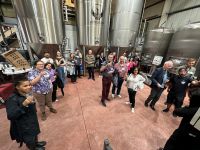

During the short break, everyone was invited to try a homemade yeast cake and to wash it down with some Sentia. Abena Apiedu, East London University, gave a talk explaining her research on effects of Sentia on sociability in drosophila. She shared her promising results regarding combating isolation in males. After that talk, many initially reluctant attendees decided to give Sentia another chance.

The next talk was by Tom Ellis, Imperial College. He took us on a journey of developing synthetic yeast chromosones: starting with why and ending with what's next, covering quite a lot of how in the middle.
100% of attendees who filled our feedback form felt positive about the event. You had to be there!
Dagmara Krzysztofiak, AMRSB
Park Grass visit in partnership with the ECT
It was a hot and sunny day when more than 20 people made it to Rothamsted Research for the visit to Park Grass; a long-term ecological experiment (LTE) which has been going since 1856. The London branch partnered with the charity Ecological Continuity Trust [ECT] (an RSB-supporting organisational member) to host this visit. Park Grass was originally set up to examine the effects of inorganic fertilisers on agricultural yields, and it is one out of 36 active LTEs that is registered with the ECT.
Our tour of the site started with lunch as Keith Goulding (deputy chair and trustee of the ECT) introduced Park Grass and Rothamsted. Our first port of call was the weather station, the suction traps (which samples the insects), and the phenotyping facility. Andy Gregory and Jonathan Storkey from Rothamsted Research explained the science but also how the experiment has evolved with new technology over the decades. We were shown Rothamsted Manor where one of the founders of the Park Grass experiment Sir John Bennet Lawes lived while he worked there. At the Park Grass plots, Jonathan explained some of the results which highlight the trade-offs between preserving biodiversity, sequestering carbon, mitigating greenhouse gas emissions, and maximising productivity. We saw the Broadbalk plots where the experiment there has been going since 1843, and which also looks at how different treatments affect yield. The tour finished with a look inside the infamous sample archive where all the samples since 1843 have been housed.
We got great feedback on the tour, and the ECT hopes to collaborate with other RSB branches for site visits. For more information, to see other LTE sites registered with the ECT, and to get in touch to arrange a site visit, go to the ECT website.
Dr Danae Dodge MRSB
Biology Pub Quiz
12 April 2024
The biology pub quiz was a fun opportunity for members to get together and share their biology knowledge, or not in some cases, and reflect on the wonders of the living world. Who knew that a grey squirrel has made its wat to Anglesey hitching a free ride on a train, or that Darwin used to live around the corner from the pub that we were in?
With a free drink and pizza, everyone enjoyed themselves with the winning team celebrating in style with plague pathogen giant microbe keyrings as prizes.
We look forward to the next quiz and chance to flex out biological brains.
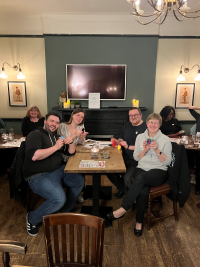
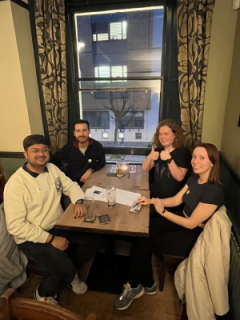
Dr Paul Davies FRSB
Sustainability in biomedicine lecture
13 March 2024
This was a shared event organised by the London branch, Kent, Surrey and Sussex branch and Kingston University.
This social event aimed to bring awareness to sustainability within global healthcare, biomedical industry and research. The talks provided a comprehensive look into targets for improvement (e.g. deploying circular economy around lab plastics) and threats to look out for (e.g. increasing spread of zoonotic diseases due to climate change), highlighting the intersection between society and environment.
 Speakers included:
Speakers included:
•Mark Fielder (KU) - zoonosis and climate change
•Hilda Mulrooney (LMU) - food security
•Simon Gould (KU) - antibiotics
•Ahmed Elbediwy (KU) - cancer treatments
•Sianne Schwikkard (KU) - natural products
•Colin Francis (LabCycle) - recycling lab plastic
The overall message was that we can and have to use our resources better.
Dr Paul Davies FRSB
AGM and lecture by Professor Nick Lane
20 September 2022
As part of the 2022 AGM, we were treated to a fascinating talk by Professor Nick Lane. Nick, professor of evolutionary biochemistry at UCL, talked about how our understanding of the origins of life can be informed by developing a better understanding about how the biochemistry of life arose.
Drawing on his latest book Transformer: The Deep Chemistry of Life and Death, Nick took us on a tour of how the respiratory pathways evolved and what we can earn about these processes in extreme environments. His ideas challenge some of the current thinking about the origin of life and shed light on the potential for searching for life on other planets. 
Dr Paul Davies FRSB
A trip to Camley Street Natural Park
21 May 2022
Run by the London Wildlife Trust, Camley Gardens is in a unique, urban location set amidst the newly developed King's Cross area.
During our guided visit, members were able to explore the ponds, wildflower meadows and planting designed to encourage butterflies and other invertebrates. Running alongside the Reagent's Canal, we were also able to explore the reedbeds and some of the animals found in this interesting part of London.
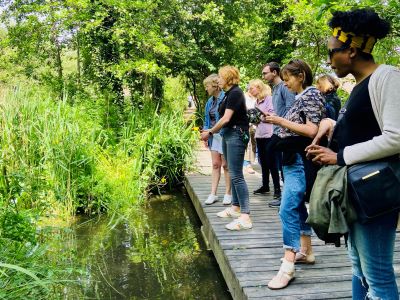

Dr Paul Davies FRSB
AGM and Biology Brain Buster
14 September 2021
Instead of an in-person talk, this year the London branch Annual General Meeting was celebrated with an online Biology Brain Buster quiz. Players had to show-off their knowledge of Biological Myths, Biology in London and Biology odd-one-out. The evening was enjoyable and a great way to keep members in touch with one another.
Dr Paul Davies FRSB
A talk from the London Wildlife Trust
23 February 2021
As part of our online series, Mathew Frith, director of conservation at the London Wildlife Trust, gave a talk entitled "The extinction crisis; what does it mean for nature in London and our work to address it?".
The fascinating talk took us through the visitor of conservation in London, the worrying decline of biodiversity and the welcome message that comes from the work of organisations like the Wildlife Trust.
Watch Mathew's talk on the RSB YouTube channel.
Dr Paul Davies FRSB
Learning and Engagement with the Royal Parks
21 January 2021
As part of our online series, Charlotte Cass, learning officer at the Royal Parks, gave a virtual talk on engaging people with nature.
In her talk, Charlotte described the variety of ways in which the Royal Parks are teaching people about the valuable ecosystem in our case and getting them involved in practical conservation and citizen science. It really opened everyone's eyes to the wonders of wildlife in London.
Watch Charlotte's talk on the RSB YouTube channel.
Dr Paul Davies FRSB
Tour of the Royal Veterinary College
18 February 2020
Our visit to the Royal Veterinary College Museum was both enlightening and a lot of fun. The museum started in the courtyard where we encountered the first specimens placed around the modern café’ area. These included a polar bear and a small elephant skeleton.
In the Dissection Room, used for practical classes, guides enthusiastically described to us horse and cow anatomy painted life size models and corresponding skeletons as well as smaller animal skeletons and plastinated organs from different species. The guides reassured us that all the plastinated tissues and small animals were safe to hold and it was great to have hands on experience.
Lucy, a vet and science presenter, then took us to a lecture theatre and demonstration room. This room has remained largely unchanged for a hundred years and live animals continue to be brought in during lessons.
In the museum we found a collection of fixed specimen in bottles and animal skeletons including Foxhunter, a large champion show jumping horse. A table had also been laid out with a number of bones for us to identify. The quiz was really fun and we managed to identify a number of unfamiliar bones thanks to the guidance of Lucy and the student ambassadors, and, crucially, to the presence of a vet within our team!
Together, the tour was most enjoyable and very stimulating. As the museum is not normally open to the public, we were very fortunate to have the opportunity to visit and be guided through by such knowledgeable and passionate young vets.
Professor Patrizia Ferretti FRSB
CPD for Secondary School Teachers
8 October 2019
This event brought together biology teachers from across London to find out how London-based institutions such as the London Wildlife Trust, Centre for the Cell and The Royal Parks can support their work with pupils.
The newly published biology primers were on show to help teachers think about how these books can help pupils bridge A-level and undergraduate biology. The event also gave teachers the opportunity to share ideas and resources with one another and reflect on how exciting it is to be teaching biology at this time.

Dr Paul Davies FRSB
Visit and tour of the Temperate House at Kew Gardens
15 June 2019
Always an exciting place to explore, our visit to Kew Gardens gave members the opportunity to hear about the development of the newly refurbished Temperate House and see how the work in the glasshouse is linked to research raking place in the laboratories at Kew.
We were also treated to an exploration of the Rose Garden and Palm House, always a firm favourite. The tour ended with a visit to the Princess of Wales Conservatory which, with its biomes, transports the visitors around the world. A truly inspirational visit.
Dr Paul Davies FRSB
A visit and tour of London Wetland Centre
18 May 2019
Attendees to the London branch event had access to the London Wetland Centre both before and after the guided tour, so we were able to make use of the lovely hides and walks throughout the day.
The Wetland Centre was also running a Gardening for Wildlife event on the same day we visited, so there were plenty of wildlife charities (e.g. RSPB, Bat Conservation Trust) on hand with stalls to ask questions and find out more about their work.
The RSB group was split into two tours, the one I joined gave us an informative talk about the origins of the Wetland Centre and its importance to wildlife in London and internationally, while we explored the site. We also learned about the need for high quality-plant identification skills when you are out foraging for salad - don’t get cow parsley mixed up with hemlock! And we got to find out what the mysterious noise was in the pond, not a duck but a Marsh Frog, a species which, from the sounds of it, is doing very well at the Wetland Centre!
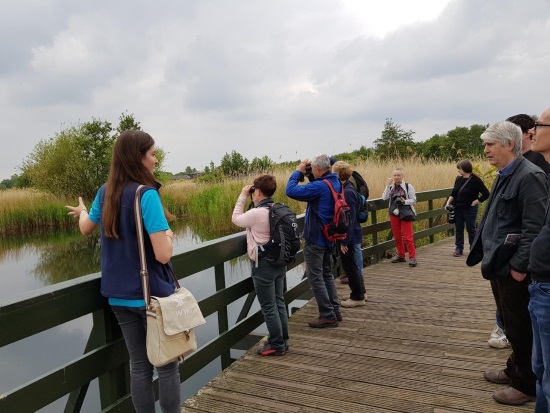
Lapwings could also be seen flying above us, an amazing sight in London of these threatened birds, it really highlighted the fantastic work being done at the centre to provide high-quality habitats so that wildlife can thrive in the city.
Dr Alice Baynes MRSB
Visit to the Bethlem Museum of the Mind
2 March 2019
On a sunny day early in March members of the London branch committee and fellow RSB members travelled to Beckenham to visit the Bethlem Museum of the Mind. This small but well curated museum stands on the grounds of Bethlem Royal Hospital, the oldest psychiatric hospital in the world.
The visit started with us all gathering in the beautiful wood panelled committee room where we were given a brief history of the hospital from its origin in 1247 as a priory in Bishopsgate to its current location, where it has been based since 1930.
We were also told about the iconic sculptures that guard the staircase up to the museum depicting raving and melancholy madness. The walls of the room were adorned with portraits, including one of Henry VIII, and coats of arms – what a wonderful start to our visit. We were then invited to take a self-guided tour of the collection, but staff were always on-hand to answer questions.
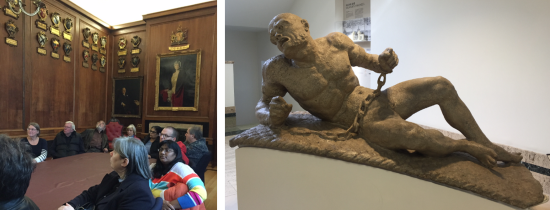 The displays were informative - both inspiring and shocking. Inspiring, because of how patients' stories and artwork highlighted how far we have come in our understanding and treatment of mental health. Shocking because of the selection of restraints and straitjackets on display, together with a section of a padded room that was used to seclude patients. The visit provided a wealth of fascinating information that provoked thought and discussion and was enjoyed by all.
The displays were informative - both inspiring and shocking. Inspiring, because of how patients' stories and artwork highlighted how far we have come in our understanding and treatment of mental health. Shocking because of the selection of restraints and straitjackets on display, together with a section of a padded room that was used to seclude patients. The visit provided a wealth of fascinating information that provoked thought and discussion and was enjoyed by all.
Dr Brenda Williams MRSB
Branch AGM and Lecture by Professor Stephen Price
17 September 2018
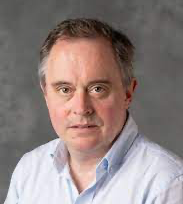 As part of the AGM, Professor Price (professor of developmental neurobiology) gave a fascinating talk entitled 'Combinatorial codes for building bird brains'. During the talk, Stephen spoke about his work, specifically how his work on embryos is helping him understand how neural pathways develop. This work is revealed in the way that the brain develops and how networks forms. Stephen gave the audience pause for thought as he talked through the way bird brain development lead to intelligence which rivals many mammals. The talk was fantastic and left the audience with lots to think about.
As part of the AGM, Professor Price (professor of developmental neurobiology) gave a fascinating talk entitled 'Combinatorial codes for building bird brains'. During the talk, Stephen spoke about his work, specifically how his work on embryos is helping him understand how neural pathways develop. This work is revealed in the way that the brain develops and how networks forms. Stephen gave the audience pause for thought as he talked through the way bird brain development lead to intelligence which rivals many mammals. The talk was fantastic and left the audience with lots to think about.


